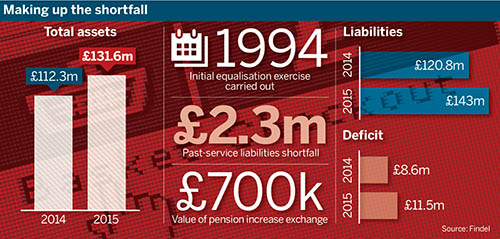Findel Group Pension Scheme has paid more than £2.3m in past-service costs to make good an error in which a member benefit equalisation exercise was implemented incorrectly.
Equalisation of retirement ages between men and women, following legislation in 1990, has been a persistent issue for schemes of all types. Many schemes’ data was not revised correctly, potentially leading to added liabilities further down the line.

In its most recent full-year results up to March 27 2015, home and leisure retailer Findel said: “Advice was received during the first half of the year suggesting that the equalisation of normal retirement ages between male and female members of the scheme in 1994 was not implemented correctly and as a result past service liabilities were understated.”
A lot of schemes fired out this announcement and continued on their way thinking they had made the amendment
Marcus Fink, Ashurst
However, the cost to the £131.6m Findel scheme was partially offset by a £700,000 credit resulting from a total pension increase exchange exercise – a liability management exercise where deferred members aged over 55 were offered a transfer value to a defined contribution arrangement with a higher immediate but non-increasing pension.
Findel was unavailable for further comment.
Barber ruling
Schemes were required to equalise benefits following the Barber ruling on May 17 1990, which stated men and women had the right to equal pension benefits as of that date.
When benefits were equalised, typically a few years later, schemes were required to pay disadvantaged employees the same level of benefit as advantaged employees for the period between the ruling and the equalisation of benefits. This period was known as the ‘Barber window’.
Source: Findel
But Marcus Fink, partner at law firm Ashurst, said many schemes failed to update their retirement ages in a way that was compatible with their scheme rules, for example sending out announcements without formalising the change through a deed.
“A lot of schemes fired out this announcement and continued on their way, thinking they had made the amendment,” he said.
This resulted in the Barber window being open far longer for those schemes, increasing the level of benefit they are required to pay their members.
Monica Cope, chief operating officer at scheme data specialist Veratta, said: “It is fairly common, even to this day, for pension schemes to suffer issues in relation to equalisation – for example, a Barber window not effectively closed by a valid deed of amendment.
“Pension scheme data can sometimes act as a barrier to rectification,” she added. “Poor data quality is frequently cited in industry surveys as one of the biggest hindrances to large-scale scheme projects.”
It’s a bit of a minefield, but it’s quite obvious. When you want to make an amendment you should open the trust deed and see what it says
Lesley Browning, Norton Rose Fulbright
Duncan Buchanan, partner at law firm Hogan Lovells, said this can lead to schemes being forced to pay sums that can reach tens of millions of pounds.
He said: “It’s costly… you have to improve members benefits, you’ve also got to go back and reconcile the pay arrears.”
Seeking recourse
Buchanan said some schemes also seek to claim against the professional advisers who helped implement the change.
Lesley Browning, partner at law firm Norton Rose Fulbright, said that while typically claims would have to be made within six years, many schemes make a latent damage claim against their adviser, which can be brought within three years of the problem being discovered.
She added that equalisation problems were more common among “smaller schemes that did not take appropriate advice”.
“It’s a bit of a minefield, but it’s quite obvious,” she said. “When you want to make an amendment you should open the trust deed and see what it says.”

















